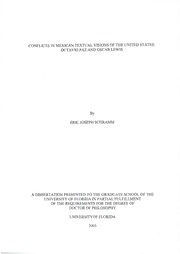
Conflicts in Mexican textual visions of the United States : Octavio Paz and Oscar Lewis PDF
Preview Conflicts in Mexican textual visions of the United States : Octavio Paz and Oscar Lewis
CONFLICTSINMEXICANTEXTUALVISIONSOFTHEUNITEDSTATES: OCTAVIOPAZANDOSCARLEWIS By ERICJOSEPHSCHRAMM ADISSERTATIONPRESENTEDTOTHEGRADUATESCHOOLOFTHE UNIVERSITYOFFLORIDAINPARTIALFULFILLMENT OFTHEREQUIREMENTSFORTHEDEGREEOF DOCTOROFPHILOSOPHY UNIVERSITYOFFLORIDA 2003 ACKNOWLEDGMENTS Thisprojectcouldnothavebeencompletedwithoutthelovingsupportof mywife,Christine. StevenKrutprovidedthoughtfulrecommendationsonthe study'scontent,aswellasimportanttechnicalassistanceandinvaluable friendship. IwouldliketothankthestaffoftheLatinAmericanCollectionatthe UniversityofFlorida,especiallyRichardPhillipsandJustinoLlanque-Chana, whowentaboveandbeyondthecallofdutytohelpmewithmyresearch. Idedicatethisworktomyparents,JamesandPatriciaSchramm;andto mychildren,LarkinOliviaandMilanJames. ii 1 TABLEOFCONTENTS page ACKNOWLEDGMENTS ii ABSTRACT iv CHAPTER 1MEXICOANDTHEUNITEDSTAES(US):OCTAVIOPAZANDOSCARLEWIS1 Introduction 1 PazandLewis:Modernismand(AnEmbryonic)Postmodernism 1 Anti-AmericanisminPaz'Predecessors 17 Paz'EarlyWork 26 Lewis'PredecessorsandEarlyWork:TheBirthofthePopularVoiceinLatin AmericanLiterature 30 RepresentationoftheUSinLewis'Work 46 Conclusion 48 Notes 50 2PAZANDTHEUS:ALABYRINTHOFMODERNISTAMBIGUITY 52 Introduction 52 "MexicanMiracle,"theUS,andOctavioPaz 56 TheUSinPaz'MexicanMyths 61 ModernistReconciliationofBinaryOpposites 69 LaterEssays:FromtheLabyrinthtoFreeTrade 77 Conclusion 81 3LOSHIJOSDESANCHEZ:WHOSEVISIONOFTHEUS? 82 Introduction 82 Lewis'ObjectivesandtheNarratorsofLoshijosdeSanchez 86 BacklashAgainstLewis'Vision 99 Conclusion 103 Notes 104 4THEUSIMAGEINMEXICANESSAYANDTESTIMONIALINTHE AFTERMATHOFPAZANDLEWIS 106 Introduction 106 RecentVisionsoftheUSinMexicanEssay 108 TestimonialinMexicoAfterLewis 118 Conclusion:TheFallandFutureRiseofLatinAmericanTestimonial 125 Notes 130 WORKSCITED 131 BIOGRAPHICALSKETCH 138 in AbstractofDissertationPresentedtotheGraduateSchoolofthe UniversityofFloridainPartialFulfillmentoftheRequirementsfortheDegreeof DoctorofPhilosophy CONFLICTSINMEXICANTEXTUALVISIONSOFTHEUNITED STATES:OCTAVIOPAZANDOSCARLEWIS By EricJosephSchramm December2003 Chair:DianeMarting MajorDepartment:RomanceLanguagesandLiteratures ThisdissertationcomparesanintellectualMexicanviewoftheUnited States(thatofOctavioPaz,inEllaberintodelasoledadandotheressays)witha popularone(thatofthepoornarratorsofOscarLewis'LoshijosdeSanchezand othertestimonials). Ideologicalimplicationsofthetwoliteraryforms'varying processesofconstructionarediscussed. TheMexicanintellectualviewoftheUS inthetwentieth-centuryislargelydominatedbytheanti-USstancepopularized bytheearlymodernistasandfurtherpromotedinpost-Revolutionarycultural nationalism. Paz'expressionisuniqueinthatitwhileitdepartsfromthiscritical modernistastance,italsolooksatMexicanhistoryinmythicalandrather fatalisticterms.Thisemphasisonmyth,aswellasPaz'incorporationofEuropean modernisttechniques,especiallysurrealism,accentuatestheaestheticimpactof hisworkandtendstodiffuseanddisarmthepoliticalcritiqueoftheUnitedStates. iv Inthisway,Paz'workparticipatesintheiuegodeimaRenesallowingMexican governmentsbetween1945and1980topresentanationalistimagewithout puttingUSinterestsindanger. Lewis'testimonialsrepresentapioneeringeffortinthemovementtomake audiblethevoicesofLatinAmerica'sless-advantagedmajority. Thetestimonial movement,becauseitrejectsgrandnarrativeslikethedefinitionoflomexicano, reflectsanascentpostmodernism,whichshouldtranscendtheManicheanview opposingallclassesintheUnitedStatestothoseinLatinAmerica,andviceversa. WhilethelifestoriesoftheSanchezfamilyindeedrevealconsiderableacceptance ofUSculture,itisapparentthatLewis'ownviewsoftheUSroleinMexico substantiallyimpacthistexts. Similarcomplicationsresultingfromtestimonial's dualauthorshiparestudiedinGabrielCareaga'sBiografiadeunjovendelaclase media. Despitetheirflaws,thesetextsbyLewisandhisdisciple,Careaga,reveal importantpopularperceptionsoftheUS. Inaddition,testimonial'sdifficulties havecausedLatinamericaniststoengageinhealthyanalysisoftheirownpractice, indicatingstrategieswithwhicheffectivetestimonialcancontinuetobeproduced. v CHAPTER 1 MEXICOANDTHEUNITEDSTATES(US): OCTAVIOPAZANDOSCARLEWIS theNorthAmericanworldblindsus withitsenergy;w—ecannotseeourselves, wemustseeyou CarlosFuentes1988,5. Introduction IexaminedvariousincorporationsoftheUSintoselectedMexicans' descriptionsoftheirnationandthemselves,aswellasthewaythose representationsareaffectedbytheirparticularliteraryformats. BecausetheUSis oftenseeninMexicoasalandofopportunityandprogress,yethistoricallyhas posedthesinglegreatestthreattoMexico'ssovereignty,Mexicanattitudestoward thenortherncountryarevariedandcomplex. SuchobserversofUS-Mexican relationsasAlanRidingandJorgeCastanedahavesummarizedthat,because Mexicanpoliticiansandintellectualsdisdainthematerialistcultureandaggressive politicsemanatingfromtheUS,thenationalidentitytheypromoteisfoundedon antiamericanismo. Most"ordinary"Mexicans,ontheotherhand,maintaina senseofadmirationforUSorganization,honesty,andaffluence.1 This interpretationmaybeasimplification,butiscommonnonetheless. Toinvestigate aspecificexampleoftheapparentdivisionbetweeneliteandpopularMexican sentimenttowardtheUS,IevaluatedimagesoftheUSintheessaysofOctavio Paz,oneofMexico'smostrenownedintellectuals;andinthetestimonialliterature ofOscarLewis,whichrepresentsoneofthefirstforumswhereless-advantaged 1 2 Mexicanscanbeheardintheirownwords. Suchcombinedanalysispresentsa broaderoverallpicturethanwouldresultfromthestudyofeitherintellectualor populartextsalone. AsilluminatingastheseworksareintermsoftheMexicanperceptionof theUS,theyareperhapsevenmorerevealingofthestrengthsandlimitationsof theliteraryformstheyrepresent. Idemonstratethatthemodernisttechniques employedbyPazcreateadualeffect,appearingatfirsttomaintainthetraditional MexicanintellectualdisdainoftheUS,whiletheoverallmessageofhiswork reinforcestheperiod'spoliticalstatusquoofincreasingeconomicintegration. TheduallyauthoredtestimonialliteraturesuchasthatproducedbyLewisoffers anothercomplexity:theirresolvabletensionbetweentheinterestsofthepeople interviewedandthoseoftheinterviewer. Itisdifficulttodetermineifthepro-US attituderevealedinLewis'workaccuratelyreflectshisinterlocutors'opinions,or istheresultofhisideologicalinfluence. AlthoughLewis'innovationsbroke importantgroundintermsofdemocratizingliterature,assuringthatbothparties' interestsareservedremainsoneoftestimonial'smostproblematicissues. MexicanattitudestowardtheUSarenotconstant,butaffectedby historicalfactors. TheworksIhaveselectedemergefromthe1950s(Paz),and early1960s(Lewis),andrespondtoandreflecttheconditionsoftheirtime. AsI explainindetailinChapter2,thestructuralchangesmadetopost-WorldWarII MexicansocietyandtoMexico'srelationshipwiththeUSmakethisaparticularly relevantperiodofstudy,withprofoundeffectsoncurrentconditions. Although noneoftheworksconsideredheretakeintoaccounttherecent,dramaticchanges 3 inMexicanattitudestowardtheUS,theirconsiderableinfluenceistracedupuntil thelate1980s. OctavioPaz'Ellaberintodelasoledadisconsideredthefinestanalysisof nationalcultureinMexicanintellectualhistoryand,foritsrefinementofworkby earlierthinkerssuchasAntonioCaso,JoseVasconcelos,andSamuelRamos,the culminationoftheMexicanquesttoexpressthenation'sidentitythrough literature. NumeroussucceedingMexicanessayists(includingCarlosMonsivais, CarlosFuentes,andGabrielZaid)haveindicatedtheirimmensedebttoPaz' thought,strengtheningMartinS.Stabb'sassertionthatPaz'wasthemost dominantvoiceintheMexicanessayinthesecondhalfofthetwentiethcentury (Stabb,"TheNewEssay"47-49). ReferringspecificallytoEllaberinto,Paz scholarEnricoMarioSantiwritesthat"yaseaparaexaltarlooparasituarsecontra el,practicamentetodalaensayisticamexicanasobrelaidentidadnacional publicadadesde1950hatornadoencuentaellibrodePaz"(128). Becauseofits tremendousstatureandtheinfluenceithashadonthenationalidentitydiscussion inMexico,Ellaberintoisatleastonevalidsourceofintellectualsentimenttoward theUS. ThefactthatitwasPaz'encounterwithUSculturethatgeneratedhis musingsonMexico(Ellaberinto147),andthattherelationshipbetweenthetwo countriesisoneofthetext'scentralthemes,makesitaparticularlyappropriate choiceforthisstudy. InadditiontoEllaberinto,IexamineOscarLewis'LoshijosdeSanchez. TheSpanish-languageeditionofLoshijoswasreleasedin1964,althoughitwas firstpublishedinEnglishtranslationin1961. Composedofthefirst-personoral 4 historiesofapoorMexicoCityfamily,whichLewistape-recorded,transcribed, andeditedbeforepublishingthemalongwithalengthyintroduction,Loshijos representsapioneeringeffortinthewidespreadmovementtomakeaudiblethe voicesofLatinAmericanswhowouldnototherwisebeheard. AlthoughRicardo Pozas'JuanPerezJolote(1948)wastheregion'sfirstsuchwork,Lewis'useof thetaperecorderwasrevolutionary,actingasaprimaryinfluenceonsuchwriters asMiguelBarnetandElenaPoniatowska. Thesewriters,inturn,wereimportant contributorstotheLatinAmericantestimonialmovement,whichreceivedits greatestacclaimin1983withMellamoRigobertaMenchu(1983). Testimonial narrativerepresentsthemostlogicalliterarysourceforthekindofpopular sentimentthisstudyseekstoevaluate. TheSanchezfamilymemberswhonarrate LoshijosindeedprovideavastlydifferentperspectiveoncontemporaryMexican societythandoesPaz. Castaneda'sandRiding'sassertionthat"average" MexicansaremorelikelytoadmiretheUSthantodisdainit,appearstobe confirmedatnumerouspointsintheSanchezstories. TheSanchezcaseoffersauniquesetofconditions,however,sinceLewis, theproject'sdirector,wasbornandraisedinNewYork. BecauseaUScitizen compiledthisoftenacerbicallycriticallookattheMexicansocialcondition,the MexicanpublicationofLoshijosgeneratedenormouscontroversyandsome virulentlynationalistreactions. Thequestionofwhowasmostresponsibleforthe wordswasattheheartofthedispute. Thecollaborationbetweencompilerand narratorintestimonialalwaysbringsupanumberofinterestingandimportant questionsregardingtheirauthorship. Infact,theargumentthatpopularor subalternsubjectscanneveraccuratelyrepresentthemselvesintestimonial literature,becausetheirvoicesareinevitablyappropriatedbythecompiler'sinthe promotionofeconomicinterest,haspersuasivelybeenmadeatleastsinceGayatri Spivak's1988"CantheSubalternSpeak?". Thedebateispointedenoughwhen thecollaboratorsshareanationality;itbecomesevenmoreproblematicwhena NorthAmericanintellectual,representingscienceandknowledge,"mines"the lifestoriesofpoor,semi-literateorilliterateLatinAmericanworkers. Project Camelotoffersanexampleofhowinformationobtainedthroughanthropology andothersocialscienceshasbeenusedtomaintainUShegemonyinLatin Americaandotherregions.2 Theissuesinvolvedindeterminingthevalidityof testimonialdiscourse,andthegenre'sviabilityasaliteraryform,areaddressedat lengthinthisstudy,butitisimportanttorecognizehereLewis'workasa forerunnerinthepromotionof"ordinary"Mexicanviewpoints. — Theuniquenessoftestimonialdiscourse itsdualauthorship,andthefact thatthenarrators,whousuallyhaveneverbeeninvolvedintheprofessional productionofliterature,basetheirstoriesonlimitedpersonalexperienceinstead — ofwell-readworldliness maycausethecomparativeanalysishereofPaz'and Lewis'workstoappearproblematic. Lewis'testimonialworksarenotessays,but theessayissuchaflexibleandinclusivegenrethatitmayinfactbelogically connectedandcomparedtootherhybridandexperimentalformslikethe testimonial. TheparametersofPaz'owngenre,theessay,havebeennotoriously difficulttodefine. MartinS.Stabb,aprominentscholaroftheHispanicessay, remindsusofthegenre'smostfundamentalformalfeatures:"theessayisa
